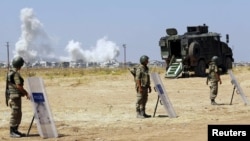Turkish security forces are engaging in what is being seen as an unprecedented crackdown on the Islamic State militant group — an indication that Ankara’s policy towards the Islamic group has changed.
July has seen Turkish security forces step up operations against Islamic State supporters in Turkey.
Last week, 21 alleged members were detained in dawn raids spreading across several cities. Security forces claimed large amounts of ammunition were found along with uniforms.
Local media this month also reported large numbers of arrests of would-be jihadists seeking to enter Syria through Turkey.
Ankara has been under considerable pressure from its Western allies to crack down on the Islamic State group. Turkey, which borders both Syria and Iraq, is routinely described by its critics as being a jihadist superhighway.
The raids indicate a change in Ankara’s stance towards Islamic State, said Semih Idiz, columnist for Turkey’s Cumhuriyet newspaper and al-Monitor website.
"There has been much talk they were a little cautious ... not only because of the blowback threat, but because they felt initially groups like this might help topple Assad and then they would be able to be controlled,” he said. "... Ankara is gradually shifting to the other side of the fence."
Soli Ozel, an international relations expert at Istanbul’s Kadir Has University, said the crackdown on the Islamic States is a response to growing international pressure.
"Turkey is very unhappy - maybe a bit too late - to be identified as a party to the sectarian fighting in Syria,” he said. “And it is very rapidly trying to disassociate itself from that label. And its attitude vis-a-vis IS seems to have changed rather drastically in the past two, three week."
The crackdown on the Islamic State comes after the Islamist-rooted AK Party lost its majority in parliament in last month’s general election. Following that setback, there have been growing calls within the party for a reassessment of its foreign policy.
Last week, former President Abdullah Gul, a founding AK Party member, strongly criticized his party’s foreign policy - claiming it had isolated Turkey.
Columnist Idiz said hard pragmatism is also a factor behind Ankara’s IS policy change.
"Especially when the tide is generally internationally moving against ISIS and you want to be on the right side of fence in that regard,” he said. “So it's a combination of this new atmosphere that is probably developing vis-a-vis foreign policy, but also it's a result of developments on the ground."
Observers warn that the threat of IS retaliation remains real, given that the groups is believed to have many Turkish members. Turkish security forces are expected to be on high alert.




